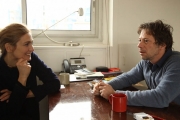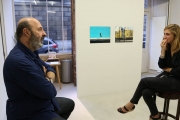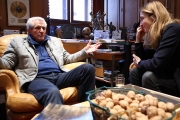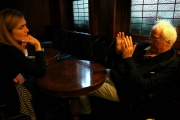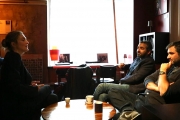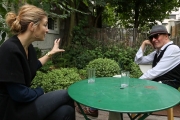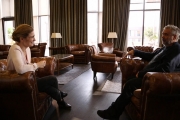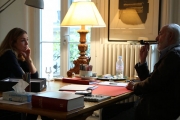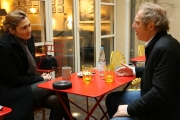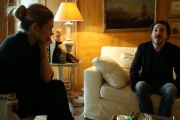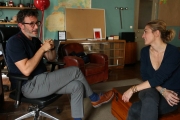![]() Presentation by and discussion with director Mathieu Busson and producer Christie Molia
Presentation by and discussion with director Mathieu Busson and producer Christie Molia
Two years after the first opus Cinéastes, seventeen male French filmmakers agree to play the interview game, answering the same question their female counterparts had been quizzed on: does cinema have a gender?
Cast & Crew
Directors • Julie Gayet and Mathieu Busson
Producer • Christie Molia / TSVP
Starring :
Mathieu Amalric, Jacques Audiard, Luc Besson, Bertrand Blier, Jérôme Bonnell, Thomas Cailley, Arnaud Desplechin, Bruno Dumont, Guillaume Gallienne, Arthur Harari, Michel Hazanavicius, Cédric Klapisch, Claude Lelouch, Emmanuel Mouret, Olivier Nakache and Eric Toledano, Bertrand Tavernier…
 The Cultural Service of the French Embassy:
The Cultural Service of the French Embassy:
Supporting Contribution for Documentary Screenings
Choose a picture to see the filmography (source : IMDB)
![]()
How was the idea of the second Cinéastes born?
During our film dedicated to women directors, Céline Sciamma and other women directors we interviewed told us “You should be asking this question to men directors”. So the desire to let men get a taste of their own medicine came about very quickly. Above all, we had great pleasure doing the first one, so…
Your selection of interviewees is fairly representative of French cinema…
As for our first film on women film directors, that was the goal: to thoroughly challenge the young generation as well as the older one, to see if there had been an evolution. Or to try to alternate auteur film directors and blockbusters’, to see if the gender problems were related to film budgets.
To what extent did the women directors interviewed in the first documentary have more elaborate thoughts on the question of gender in their trade?
Sadly, women directors are often confronted with this question, be it from journalists or others. Therefore, they are used to answering, while the men seem flabbergasted by this inquiry. Hardly anybody ever points out to them that they are MEN film makers. As Mia Hansen-Løve said, “a film directed by a woman is a woman film, whereas a film directed by a man is simply… a film”. Moreover, today, the majority of women directors must still face chauvinist reactions in the cinema sphere, in close or larger contexts, and they always have, I imagine, to prepare their defense.
In this second documentary, the male directors are at first taken aback, but then we could see them forming their thoughts on this question, one that they had often never thought about. Mathieu Amalric for example, admitted that no one had ever asked him the question about the gender of images…
We caught them off-guard. For more than 100 years, no one had ever asked them that question. For example, people made a big deal when director Jane Campion became president of the Cannes Film Festival because she is a woman. It is shocking that other than Jane Campion, no woman has received the Cannes Festival Golden Palm, and that she is one of the few women that has presided over the festival in nearly seventy years of its existence. More concretely, we tried to startle the men we interviewed, to take them by surprise. We did not really tell them in advance what the theme of the interview would be. Our goal was not to trap them, but to witness, to record live, the formation of their thoughts on the subject. We wanted this thought process to be as spontaneous as possible.
In your opinion, is the camera gendered?
I am rather Cartesian, so for me, the camera is first and foremost an assemblage of screws, metal and electronics. However, I really like the way certain male directors talked about their desire to film. Amalric talks about the necessity of being in love to prompt the filmmaking drive, when Harari and Besson evoke the obligation to love all their actors. Dumont estimated that practically “all of the history of cinema is the history of men’s desire for women”. I rejoin them in at least that point: to make a film, there must be desire, love. But then, I think that the point of view of the director is gendered if she or he wants it to be. It seems to me that when Campion’s films –here she comes again- are unanimously regarded as transposing a woman director’s vision, it is because of a conscious desire on her part. When others (often men) never ask themselves that question.
Did the question of gender beset you?
In the beginning, not really. Very little actually. It was a request [from Canal +] that we even had doubts about. Today, I do not have a definitive response to that question. It is sometimes already fairly difficult to recognize films from the same director. What is certain is that equality between women and men directors is far from being achieved. And in a milieu that often claims to be ahead of its time, it is more than a problem. It is virtually scandalous.
What were your choices of lighting and framing?
The idea, when reaching out to each director, was to be as unobtrusive as possible. Hence the absence of makeup or artificial lighting. We intentionally used light and portable equipment so that the exchanges would appear more as a conversation than as a classic, posed interview. In a similar idea, we wished to be physically close to the interviewees, even if it meant using extreme close-ups. Despite all this, to film these directors, we wanted an image that would be an homage to cinema: contrasted and with a small depth of field. The 5D camera permitted that, all while allowing for each interview and place to have its own particular color, which would give a better legibility of the exchanges during the final montage.
Do your two documentaries disclose your own opinions and those of Julie Gayet?
The intention was not to blame anyone for the situation. But with 20 interviewees (40 if you consider the two films), there are necessary diverging opinions so the temptation to take sides by highlighting one director or the other, could be real. We tried to avoid this so that the final piece would be more of a shared reflection made of multiple voices. But I imagine that, despite our efforts to remain neutral, our views showed through, at least in our choice of interviewees. But our purpose was, above all, to ask the question without inevitably giving the answer. The problem remains, but what is certain, is that I still stand on the side of those with the least amount of rights, the least opportunities. And today that group is still noticeably women. Consequently, this endeavor made me even more feminist. It is not by chance that “Busson”, which is my stage name, is in fact my grandmother’s name who divorced my grandfather at 75, to reclaim her freedom!
…Anything else?
The common denominator to the interviewees, women and men, is their love of cinema. Whether or not we like their films, they all have a common insatiable curiosity towards their colleagues. They are all relentless workers. And, as obvious as it may seem, this has been the most beautiful surprise of all these encounters.
Press Kit “Cinéastes”
French ~ 11 pages ~ 2 Mo ~ pdf



